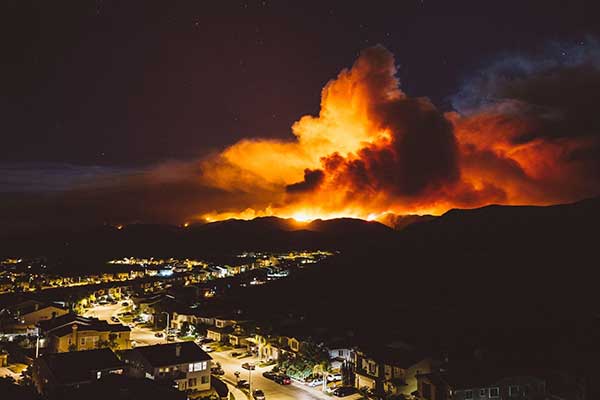In its most dire warning to date, the Intergovernmental Panel on Climate Change (IPCC) says that many of the consequences of global warming cannot be avoided and are irreversible. Still, many experts believe there is hope for preventing further damage.
According to a new report released by the IPCC, global temperatures are expected to rise above 1.5°C (34.7°F) within the next decades unless we take extreme measures.
After months of publication delays due to the Coronavirus pandemic, on August 6, 2021, the IPCC completed the initial portion of the Sixth Assessment Report, Climate Change 2021: The Physical Science Basis.
IPCC Report Is Exhaustive, But Not Over Yet
The IPCC is made up of three groups that each work to focus on a different aspect of climate change:
- Working Group I (the physical science of climate change)
- Working Group II (effects, adaptation, and vulnerability)
- Working Group III (mitigation of climate change)
The IPCC also has a special unit that develops methodologies for measuring emissions and removals called the Task Force on National Greenhouse Gas Inventories.
This finalized report came during the 14th session of Working Group 1 and the 54th session of the IPCC. This is the sixth report in a series that began in 1988. It has been underway for eight years and gathers together the findings of over 200 volunteer scientists and more than 14,000 studies.
Two more installments will follow Monday’s report in 2022. The second part will highlight the global impact of the climate change crisis, and part three will detail possible solutions to the problem.
The report’s authors found human impact to be “unequivocally” the cause of climate change consequences such as rising sea levels, heatwaves, droughts, wildfires, and heavy precipitation resulting in floods.
In a clear and urgent warning to global leaders, the IPCC’s report authors stated that this may be our last chance to act.
The Report Calls for Swift Action
United Nations (UN) Secretary-General António Guterres cautioned that the report “is a code red for humanity. The alarm bells are deafening, and the evidence is irrefutable: greenhouse gas emissions from fossil fuel burning and deforestation are choking our planet and putting billions of people at immediate risk.”
The events of 2021 have been a stark reality check for those in doubt (or in denial) about global warming:
- Heavy rains have caused devastating – and deadly – floods in Western Europe.
- An unprecedented heat wave in the American Northwest has caused devastating wildfires, many of which are still uncontained as of this report.
- Heavy smoke plumes coming out of Siberia are poisoning the air quality across the international dateline in Alaska.
- Parts of Scandinavia are suffering through a long-lasting, abnormal heatwave.
- Greece, North Macedonia, and Turkey have seen temperatures rise to as high as 116°F putting the area at risk of extreme wildfires – nearby southern Italy, Albania, Kosovo, southern Serbia, and Bulgaria are also at risk as of early August 2021.
According to the IPCC report, scientists are recording record-breaking changes in the planet’s climate, along with devastating consequences, in every region across the globe.
There Is Still Hope to Limit Global Warming
Immediate, forceful, and sustained reductions in greenhouse gas emissions could put a stop to increased global warming, helping to maintain the maximum 1.5°C (34.7°F) above pre-industrial levels recommended, and agreed to, by the Paris Climate Agreement – but only just barely.
If humanity can stop (or slow) global warming, air quality would improve reasonably quickly, but it could still take two or three decades to see global temperatures stabilize.
The lead scientist at Greenpeace UK, Doug Parr, opined, “This is not the first generation of world leaders to be warned by scientists about the gravity of the climate crisis, but they’re the last that can afford to ignore them. The increasing frequency, scale, and intensity of climate disasters that have scorched and flooded many parts of the world in recent months is the result of past inaction. Unless world leaders finally start to act on these warnings, things will get much, much worse.”
The United States is the world’s second-largest contributor to global greenhouse gas (GHG) emissions. Many believe that it will fall to the Biden administration to make significant strides in altering the trajectory we are on – so far, the President has said he wants to cut emissions in half (as compared to statistics of 2005) by 2030. Last week he signed an executive order to tighten restrictions on emissions standards for vehicles.
Opinion writer: Lynette Garet
The opinions, beliefs, and viewpoints expressed by the various authors do not necessarily reflect the opinions, beliefs, or viewpoints of Interactive Energy Group, LLC (IEG) or its parent companies or affiliates and may have been created by a third party contracted by IEG. Any content provided by the bloggers or authors are of their opinion and are not intended to malign any individual, organization, company, group, or anyone or anything.
Brought to you by energysavings.com
All images licensed from Adobe Stock.
Featured Image

